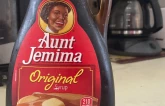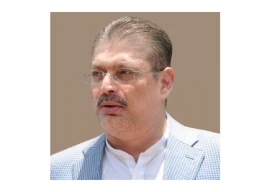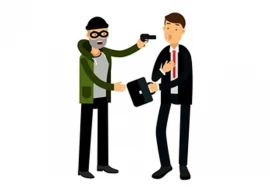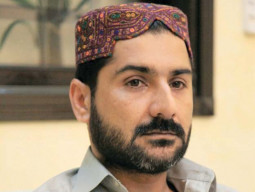During her two-week art residency in the capital of Iran, Khan had to conceal her camera and pose as an idle passerby to be able to document her stay through photographs.
With a hijab covering her hair according to the country’s laws, Khan observed that there was certain anxiety among people due to the restrictions imposed by the government.
A visual artist and curator, Khan spoke to the audience at The Second Floor on Thursday about her pictures and experiences in Tehran. She shared a picture of a board at a pizza joint which said ‘you cannot take off your hijab here’ - a concept which is perhaps alien to most in Karachi since there is no law which makes the practice compulsory for women.
While observing the stark contrasts between Pakistan and Iran, one of the main aspects she noticed was the freedom artists enjoy in the former. Not only does the government have sanctions on the dressing and lifestyle of people, says Khan, it has stringent restrictions for the artist community since the green revolution in 2009.
The ministry of culture and Islamic guidance keeps a tight rein on artists who often cannot teach or produce material that contains nudity, political remarks or is of ‘revolutionary’ nature.
The government’s policy towards arts and culture is quite indomitable, says Khan, so much so that the artists boycott the government.
There are, however, brilliant publications on contemporary photography, along with multiple websites and online journals, says Khan in appreciation of the Persian artists. Such work within confinements has produced “exotic” calligraphy and photography.
“Most of the people, however, have come to terms with these laws and restrictions,” says Khan, adding that she didn’t necessarily agree with what they have to go through.
Khan’s work showcased her journey from the tandoor to all the breads she found in five bakeries on her street, tilted ‘Bread of the People’. “My hosts told me that they boycott bread and milk every Tuesday to protest against the high rates of these two dairy items,” explained Khan. “It exuded a sense of unity and solidarity, not like the divided protests we carry out.”
Published in The Express Tribune, September 21st, 2012.
COMMENTS (1)
Comments are moderated and generally will be posted if they are on-topic and not abusive.
For more information, please see our Comments FAQ



1725967717-0/Untitled-design-(3)1725967717-0-165x106.webp)

1730547935-0/Untitled-design-(5)1730547935-0-270x192.webp)











Thank you Nazia for sharing your experience!!
I feel that the article has more to do with Nazia's Travel experience to a conservative Muslim country, but yes she does share how she saw print and electronic media appreciating Artistis works.
Every Artist would agree that oppression has always brought the best out of artists be it photographers like Reza, poets like Faiz, or writers like Enver Sajjad...analyzing the coarse of history we learn that beautiful Art is GENERALLY born in restricted environment, it helps the artists to express themselves in mysterious and extremely creative ways... ways that help them say it all, yet has enough room for interpretation to save themselves from some strict punishment.
Adversity brings the best out of one..